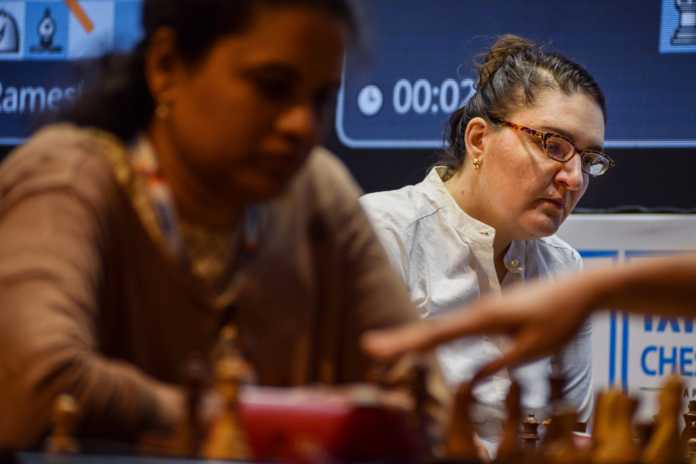A recent decision by the International Chess Federation to ban transgender women from competing in women-only chess tournaments has sparked criticism from many, as well as raising questions about why chess is separated by gender at all.
In an update to its handbook this week, the International Chess Federation or FIDE as it is known by the French acronym, announced that “In the event that the gender was changed from a male to a female the player has no right to participate in official FIDE events for women until further FIDE’s decision is made.”
Over the past several months, transgender rights have remained a topic of conversation, with many states seeking to prohibit gender-affirming care for minors. The topic of transgender women competing in women’s sports has also sparked controversy and the world governing swimming body, FINA, recently announced that transgender women are banned from competing in female-only events.
Nana Dzagnidze (right) of Georgia ponders her next move against Savitha Shri of India during their blitz chess match (women’s blitz tournament) in Kolkata on December 4, 2022. On Thursday, the International Chess Federation updated its handbook to ban transgender women from competing in the women-only category. Sankhadeep Banerjee/NurPhoto/Getty
Despite the ban on transgender women competing in the women-only category of chess, the FIDE updated handbook notes that “There are no restrictions to play in the open section for a person who has changed the gender.” According to the FIDE website, currently there is an open category, where men and women can compete against each other.
In a statement to Newsweek following publication of the updated handbook, a spokesperson for FIDE said, “The absence of such regulations caused ambiguity and therefore an established order was needed to provide the right of the transgender players being properly represented on the official register of FIDE.”
“Any further decisions related to admission of the players to official FIDE women events require a more thorough analysis that will be done and further decisions taken by the Council. Meanwhile, the transgender players are allowed to participate in the open section of the official FIDE chess tournaments,” the statement said.
While speaking with The Washington Post this week, Richard Pringle, a sociology and education professor at the Monash University in Australia said that the updated handbook by FIDE “suggests that males are somehow strategically better,” since “there’s not that physicality dimension to chess, it’s a game of strategy.”
While it is unclear exactly why chess tournaments have a separate category for women, some have speculated that it is due to the large difference in the number of men competing compared to the number of women.
According to the Washington Post, in 2019, only 14.6 percent of U.S. chess players were female and in 2020, among the 1,600 chess grandmasters, only 37 were female.
In 2020, news outlet The Conversation published an article stating that “logically, and in reality, a smaller base of females means fewer women than men at the top of the chess rating list, as one study found. Offering occasional female-only tournaments may make chess more attractive to girls and women.”
In a post on X, formerly Twitter, the National Center for Transgender Equality criticized the recent decision by the FIDE saying “This is so insulting to cis (cisgender) women, to trans women, and to the game itself. It assumes that cis women couldn’t be competitive against cis men—and relies on ignorant anti-trans ideas.”
Cisgender refers to people who identify with the gender they were assigned at birth and is the antonym of transgender.


